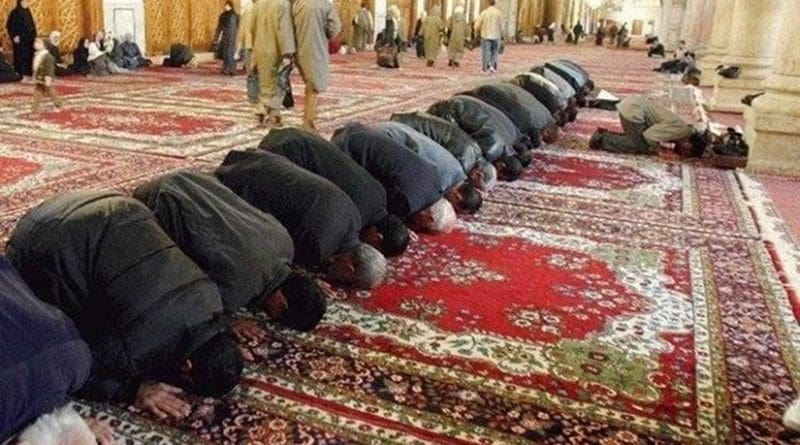Moscow’s Latest Project For A ‘Muslim Patriarchate’ Set To Fail – OpEd
By Paul Goble
Moscow’s latest effort to create a single administrative structure for Russia’s growing Muslim population will fail and fail for the same reasons earlier ones did: the absence of Islamic sanction for Russian Muslim spiritual directorates (MSDs), the ambitions of various Muslim leaders, and Moscow’s interest in continuing to play its divide and rule game.
Many Russian officials, overwhelmed by the complexity of the Muslim community within Russia and the existence of more than 80 MSDs supposedly in charge of its parts, have called for the creation of a single MSD over the Russian umma, a project some see as leading to the formation of a single Muslim “patriarchate” on the model of the Russian Orthodox Church.
The latest of these efforts has surfaced this past week, and it has attracted a great deal of media attention as, in the works of “Moskovsky komsomolets” “a new federal muftiate” (mk.ru/politics/2016/11/30/v-rossii-poyavilsya-novyy-federalnyy-muftiyat.html). But whatever aspirations its leaders or their government backers have, it is unlikely to become that.
On Wednesday, Albir Krganov, the mufti of Moscow, the Central Region and Chuvashia and until three years ago an associate of the Central MSD in Ufa, announced the creation of a Spiritual Assembly of Muslims of Russia, a name that recalls the first MSD in Russia, the Orenburg Mohammaden Assembly (interfax-religion.ru/islam/?act=news&div=65334 and ria.ru/religion/20161130/1482486913.html).
“The current situation of the umma, to put it mildly,” he declared, “leaves much to be desired.” The muftiates are fighting among themselves and competing in their attempts to get money from foreign “’sponsors.’” That in turn has led to splits and confusion among the faithful over which fetwas to follow.
Krganov said his organization already had the support of “dozens” of regional ones and was interested in promoting discussion rather than the suppression of this or that MSD. The Assembly will be directed in the first instance, he concluded, at countering “pseudo-religious extremism and terrorism.”
It is not clear how much real support Krganov has. An earlier effort to create a new centralized MSD under his direction failed. In 2010, he created the Russian Association for Islamic Agreement (All-Russian Muftiate), but it failed to take off and in March of this year it was disbanded.
Prior to this week, there were four MSDs in Russia with aspirations to dominate the Russian umma either directly or through the other 78 regional MSDs: the MSD of the Muslims of Russia in Moscow, the Central MSD in Ufa, the Coordinating Center of Muslims of the North Caucasus, and the MSD of the Republic of Tatarstan.
Russian officials have long been unhappy with this diversity of centers of religious authority. Earlier this year, Igor Barinov, head of the Federal Agency for Nationality Affairs, called for uniting them because their existence gives “additional opportunities for extremist ideas to penetrate the umma” (ria.ru/religion/20161130/1482486913.html).
In his commentary on this latest move, Andrey Melnikov, editor of “NG-Religii,” is skeptical that the Russian authorities will get there way and manage to reduce even slightly the number of MSDs with which any government has to deal or even find an effective new ally in the war on extremism in this latest effort (ng.ru/faith/2016-11-30/2_6873_islam.html).
The reasons for that are three-fold. First, the MSDs, a joint government-religious project under tsars, communists and now the Russian Federation, have no basis in Islamic law and practice. Any group of Muslim communities at least now is free to form a new one, and all Muslim parishes have the right to go their own way and even have no ties to an MSD at all.
Second, the leaders of the four largest MSDs which do have all-Russian aspirations are doubly divided. On the one hand, their leaders have a long history of distrust in one another and regularly work at cross purposes. And on the other, they more than any single MSD could do reflect the diversity of Islam in Russia.
And third, while some officials might like “a Muslim patriarchate,” many are likely to be frightened of such an institution. Were it to be created, it would likely be more difficult to manage than the current situation in which Moscow can play one group against another and thus weaken both.
Moreover, if Moscow did manage to create a single MSD, the most likely outcome would be a refusal by many parishes and individual Muslims to have anything to do with it, something that would lead to more not less independence and diversity within Russian Islam and even promote the rise of an updated version of the underground Islam of Soviet times.

